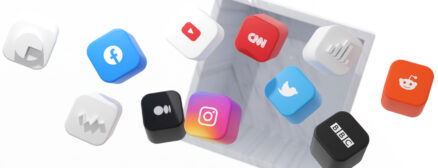The Wordle phenomenon
If you spent any time at all on Twitter this year, you certainly haven’t escaped the biggest trend thus far: Wordle. The simple word game has taken the world by storm and became the first big social media sensation of 2022.
With this in mind, we decided to take a closer look at what makes Wordle tick. What insights have we derived? Read on!
Where did Wordle come from, anyway?
Wordle is the creation of a single developer: Josh Wardle. You might have heard of him — he was previously responsible for two phenomena on Reddit, the Button and Place.
The game is a spin on the Master-Mind concept. Anyone familiar with that game will immediately understand Wordle — try and guess a five-letter word in five tries. With each attempt, the game will tell you which of the letters you got right, which ones are in the wrong place, and which ones aren’t in the word at all.
Once you guess your word, you’re invited to share your result on Twitter, which is presented as a grid of coloured emoji squares. This is one of the key factors behind Wordle’s instant viral success. Once the mysterious squares started invading people’s timelines, it became hard to ignore the game and not give it a go.
How did Wordle achieve its success?
…and that’s all there is to Wordle, really. The game is extremely simple, and because it’s a web app, it runs on everything that can handle some relatively simple JavaScript. It doesn’t have any ads. It doesn’t push players into spending money on it. It exists, it’s fun, and that’s enough. This is a common sentiment expressed by players, as seen in these tweets:
Wordle is popular because it is so simple and innocent.
No ads , no logins , no upgrades , no loot boxes , no monetisation just a simple game.
I hope game designers take the hint
— Admiral Boaty Van Boatface (@amias) January 31, 2022
Why is Wordle good? I have a few ideas. One is: it's not jammed full of growth hacky bullshit. It exists as it is and doesn't demand attention throughout the day. It's so pleasant to find a thing online where you don't feel like you're the commodity being sold
— 𝕜𝕚𝕝𝕝💀𝕥𝕚𝕞💀𝕗𝕒𝕦𝕤𝕥 (@crulge) January 12, 2022
Having played Wordle for a short while myself, I fully agree with the sentiment. In a world increasingly dominated by invasive advertising, autoplaying videos, tracking cookies and the incessant push towards monetization, Wordle feels like a genuine respite. An oasis in the hell that is the modern Web — a simple thing that brings joy and asks nothing in return.
Nice things don’t last.
As of this writing, it has been announced that the New York Times purchased Wordle for a seven-figure sum. The reactions, on the whole, are incredibly negative, with #RIPWordle trending being one of the most trending topics on Twitter.
RIP, Wordle. We knew it was too good to last, but for one bright moment in these dark times, there was a game that was free & enjoyed by all, without even requiring that users watch an ad. https://t.co/pZOS9xZseE
— 2nd Toughest in the Adolescents (@_katiedewi_) January 31, 2022
I was waiting for our Wordle fun to be ruined by a big company, just like everything else. And here it is. It was nice while it lasted.
— Hollie Kamphues (@loveholliejo) January 31, 2022
The reason I find this depressing is because Wordle felt a bit like an earlier version of the internet – one where stuff was free, wasn't stealing your data/tracking you, wasn't bombarding you with calls to download apps. And that can't really exist on the web anymore, I guess! https://t.co/weG9xOqqaW
— Hannah Williams (@hkatewilliams) January 31, 2022
There’s good news, however. Wordle is an extremely simple app: it’s only 63 kilobytes of code. It runs entirely on the client side. There’s nothing preventing people from backing the game up and hosting it themselves — as crafty hackers have already started doing, poking fun at the game’s tiny size along the way.
Many people will just go on the internet and tell lies, but I am not one of them. pic.twitter.com/j3ZQgU42GZ
— foone (@Foone) February 1, 2022



